
Gayle Swift here, guesting in Lori’s space. She wasn’t ready to take on another adoption expert so soon after the last one, but seeing as how I have strong feelings about Gotcha, as well as ideas on a more attuned approach, I am happy to step in with my own advice.
Dear Abby: Three Reasons to Rethink Gotcha
Abby, you recently responded to a letter from an adoptive parent who wanted to share how she informed her child about his being adopted. Her solution was to celebrate his “Gotcha Day,” the day he joined their family. By making it a party day she hoped to take the sting out of telling him he was adopted (how and when to tell are a whole ‘nother issue).
While the intent of this unfortunate term is positive, the reality is off the mark. It is good that Mom wants to strengthen her relationship with her child and tell him the truth, and you affirmed her celebration of this significant day. But please consider why “Gotcha Day” needs further evaluation.
- First, “Gotcha” focuses on the parental experience instead of the child’s.
- Second, it objectifies the child, like a prized toy that was finally acquired.
- Third, “Gotcha” is often a term used to indicate victory or advantage over another person. Adoption is a life-altering experience for a child. “Gotcha” frames it in negative or depersonalizing language. This is not the best foundation for building a family; it almost certainly was not what this mom intended.
Alternatives to Gotcha
An adjustment in language can help. Some more suitable titles are: Arrival Day, Homecoming, Family Day, Johnny’s Day. They are all better choices because they affirm relationships and center on the child’s experience. Remember there are two sides to his special day: the happy part about joining a permanent, loving family, and the sad part, losing the family to which he was born. Be prepared for your child to feel mixed emotions. His attitude toward this day may evolve over time as he comes to understand how adoption delivered losses along with gains.
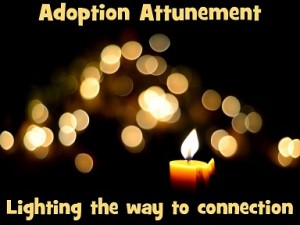
The intent of “Gotcha Day” has value and receives enthusiastic support from many adoptive parents. As parents, we enjoy reconnecting to that amazing moment when we grew our family. Truly it was a highlight of our lives.
But I take issue with the languaging as an adoption professional (I’m co-founder of GIFT Family Services, an adoption coach, and an adoptive parent and former foster parent and an adoption writer). I think we can use language that better fulfills the letter writer’s intention.
Words Have Power
Words can build or destroy relationships. Imagine someone commenting on an important choice you made:
- How could you have done something so incredibly stupid?
Or
- Knowing what you know now, how might it change future decisions?
Hear the difference. Feel the difference. Imagine the impact languaging makes on our relationships. To which words would you listen more? Which words strengthen your relationship? Which words increase the likelihood that you’ll share your innermost thoughts, feelings, fears, and dreams?
Kindness in language costs nothing and reaps huge benefits. And when it comes to something as emotionally charged as adoption word choice makes a huge difference.
When it comes to “Gotcha Day” and other complex aspects of adoption, many adult adopteesvhave grabbed the bull horn and shared their first-hand experience about adoption. They’ve helped shift the point of view from a parent-centric one to a more appropriate adoptee-centered point of view.
Adoption World Has Changed
With the movement toward openness, shame and secrecy have loosened their grip on the way we talk (or don’t) about adoption. Adoptee voices have led to an improved understanding of what adopted children need in order to grow up healthy and happy.
As a result, adoptive parents have embraced openness and installed a BothAnd paradigm. We have committed to Adoption Attunement and become the parents our children needed instead of expecting them to become the children about whom we’d fantasized. As parents we must provide kids the language with which they can express complex adoption-related feelings. Think about this when determining if/how your family will celebrate this life-changing day in a way that strengthens your relationship.
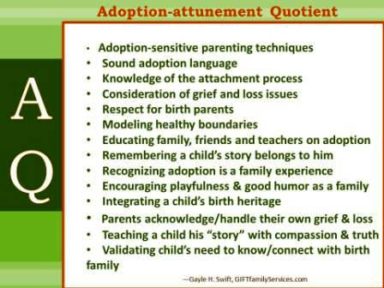
Deliver an unequivocal message that recognizes adoption as a BothAnd relationship. Reassure children that it is possible and acceptable to have a range of feelings, some of which might include sadness, longing, anger, grief, etc. Make it clear that it is okay to have an interest and respect for one’s birth family. Without the benefit of all parts of themselves, something foundational will be missing. They might then feel incomplete, off-balance and out-of-control.
Some Kids Want to Commemorate The Day. Others Do Not.
For those who experience sadness associated with this day, parents must respect their emotions and limit any “celebration” to an internal, personal event. None of us want to extract our enjoyment at our child’s expense. Even if you adopted your child as an infant, ask him if he wishes to celebrate the day they became part of your family.
Family membership is a high stakes game for adoptees. In the absence of clear permission to express these thoughts and emotions, adoptees will often stifle their true feelings and inclinations because they fear that if they’re less than perfect, their adoptive family will “reject” them just like their birth families did.
Adoption realigns families in profound and abiding ways. Our language choices must honor the sacred promise we made to build our family on love and respect. We must commit to communication that encourages honesty and embraces the complex duality of adoption. When children get that we are willing to see the totality of who they are, what they think, and how they feel, they will be drawn to the harbor of acceptance we offer.
That is love, Dear Abby. That is the gift of family.
~~~~~
Gayle is co-founder of GIFT Family Services, an organization that provides coaching services to families before, during and after adoption. She writes two blogs: Growing Intentional Families Together,which discusses coaching strategies for adoptive parents, and Writing to Connect, which reviews books through an adoption-attuned lens. With her daughter Casey, Gayle co-authored the award-winning picture book, ABC, Adoption and Me: A Multicultural Picture Book. Gayle contributed to the upcoming anthology It’s Not about You: Understanding Adoptee Search, Reunion & Open Adoption. Look for Gayle on Twitter and Facebook.
- TAO on Gotcha Day
- WACAP’s How Does An Adoptee Feel About Adoption Day?
More on Giving it up to “Experts”
- My Kids Know More Than Today Show Experts
- Dear Abby’s Bad Advice to an Adoptee
- Dear Abby Mucks it Up Again
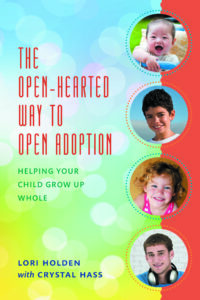
Lori Holden, mom of a young adult daughter and a young adult son, writes from Denver. She was honored as an Angel in Adoption® by the Congressional Coalition on Adoption Institute.
Her first book, The Open-Hearted Way to Open Adoption: Helping Your Child Grow Up Whole, makes a thoughtful anytime gift for the adoptive families in your life. Her second book, Standing Room Only: How to Be THAT Yoga Teacher is now available in paperback, and her third book, Adoption Unfiltered, is now available through your favorite bookseller!
Find Lori’s books on her Amazon Author page and catch episodes of Adoption: The Long View wherever you get your podcasts.

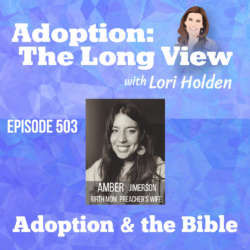
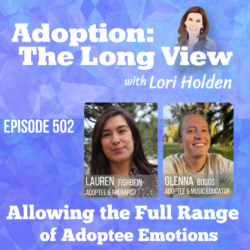
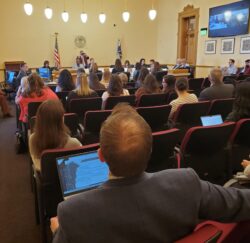
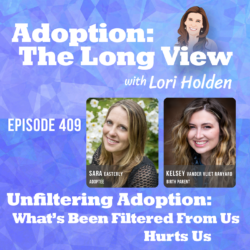

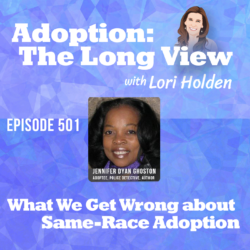

17 Responses
This is perfect.
Thank you Anne. Coming from you that means a lot.
Gayle, what a wonderful, non-judgmental post from a “both/and” perspective. Thanks!
Thank you Karen. I think it’s important that we try to remember that most people are doing the best. When we educate them to better understand what adoptees need, everybody wins.
Yes. Thank you Gayle. Words matter. Gotcha reeks of conquest and capture. Not a pretty image for an adoptee.
Yes Theresa. I believe nobody wants to feel as if they were a prize someone won. When we take the time to imagine ourselves actually in someone else’s shoes, we can gain a better understanding of how they feel and what they need. That exchange perspective can be very powerful
It’s clear that “Dear Abby” needs experts they can talk with regarding adoption and infertility because too often they completely miss the mark (isn’t this the 3rd time in recent memory).
Gayle, you’re response is very thoughtful and insightful. Particularly went there are less than positive feelings being experienced by the person that the center of adoption: the adoptee. Thank you for pointing out word choice and also the fact that there needs to be a both/and mentality.
Thanks Cristy. I think you’ve touched one important point: when it comes to adoption there are a lot of easily triggered tender spots. That’s why empathy and thought the language are essential.
It’s a great response, and we need these reminders that words matter.
I agree Mel. Contrary to the old adage “sticks and stones may break my bones but words will never hurt me,” I think we all know words can be very cutting. And once we’ve heard them it’s impossible to erase them from my memories. We might be able to forgive them but they become a permanent part of our internal archives.
I have always felt uncomfortable with the term gotcha day, but never knew why. Thank you Gayle for finding a way to so clearly express what I felt to be true. And words most definitely matter.
I think you’ve touched on something important, Caitlyn, that our intuitions can be very valuable and very insightful. When our gut sets off an alarm it’s time to listen.
I have several friends who adopted & celebrate “Gotcha Day”… and the term has always bothered me although, like Caitlin above, I’ve never been able to articulate why. Thank you for this!
Normally, I don’t care that much about “labels”. However, in this circumstance, I have to agree with Gayle. As an adoptee, I have never liked the term “Gotcha Day”. To me, It sounds as if you are “snatching” or “stealing” the adoptee. I think “Adoption Day” or “Arrival Day” are more accurate. Even using {adoptee’s name}-Day” is better than “Gotcha Day”.
Thank you for writing this article.
To me “Gotcha Day” is a beautiful memory of joy and acceptance. Not a victory over someone, not a rejection of other loved ones, or a prize. It’s a day about love. As important or more important than wedding anniversary. I’ll continue to celebrate it. Thanks for your perspective.
My kids were tweens when we were placed with them from foster care. We celebrate the day they were adopted, the day we first met which we call our family anniversary, and the day they have dubbed Homecoming Day, the day they were originally placed.
Our boys always get a calendar for Christmas and the first thing they write for important dates are those three. Gotcha Day has always sounded awful to me as well. My boys are human beings, not objects.
I love this. I never felt comfortable calling it “Gotcha Day,” but instead opted for Family Day. I never knew exactly why. You’ve put words to my feelings. Thanks.